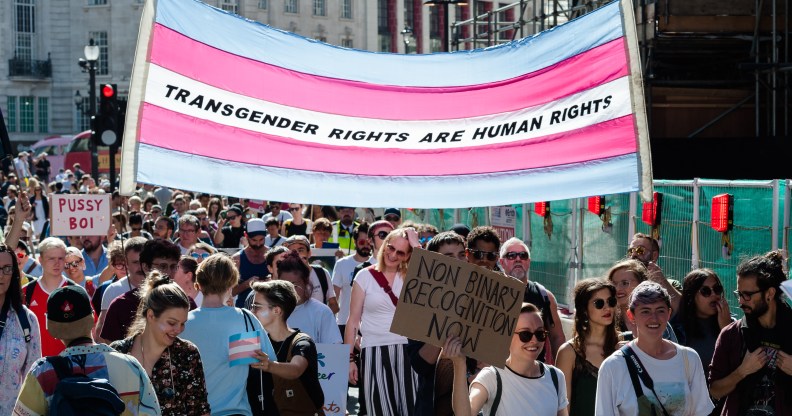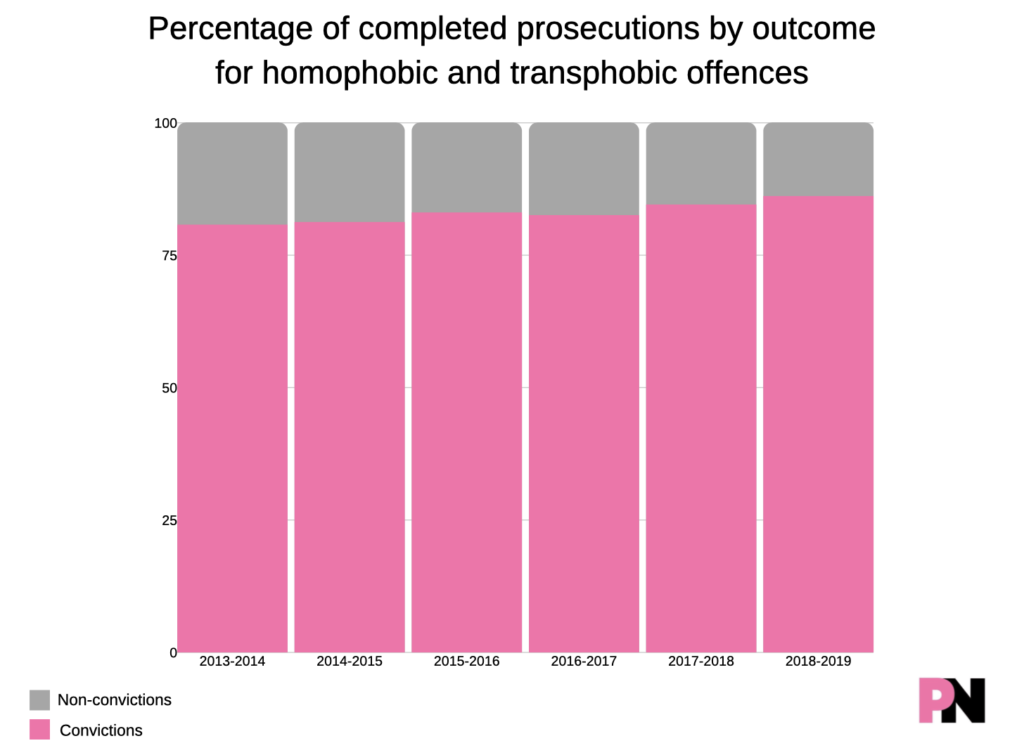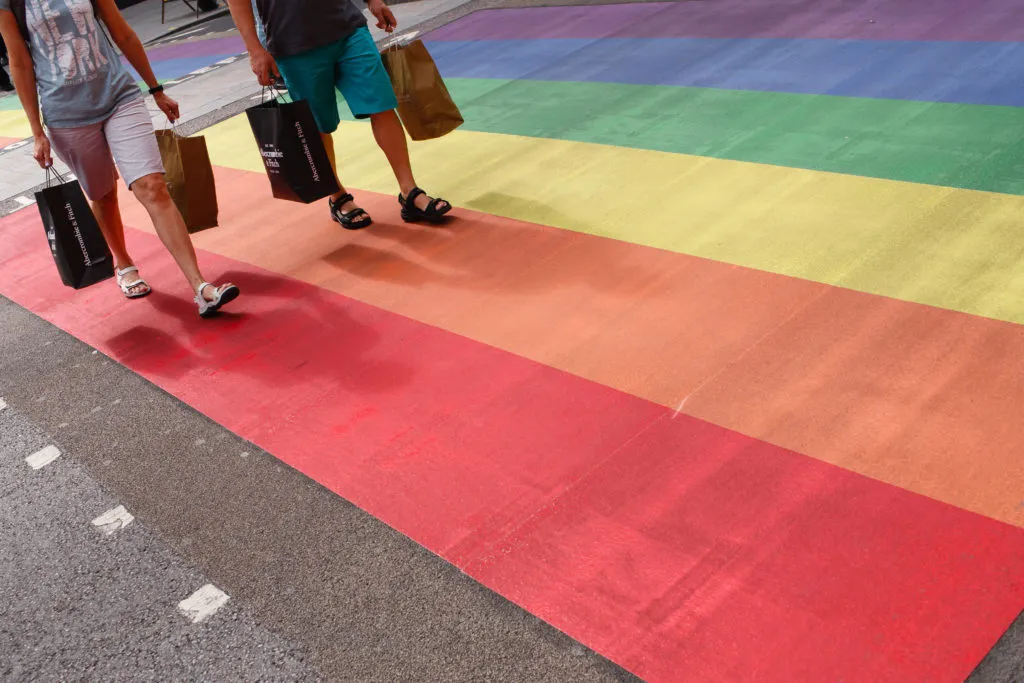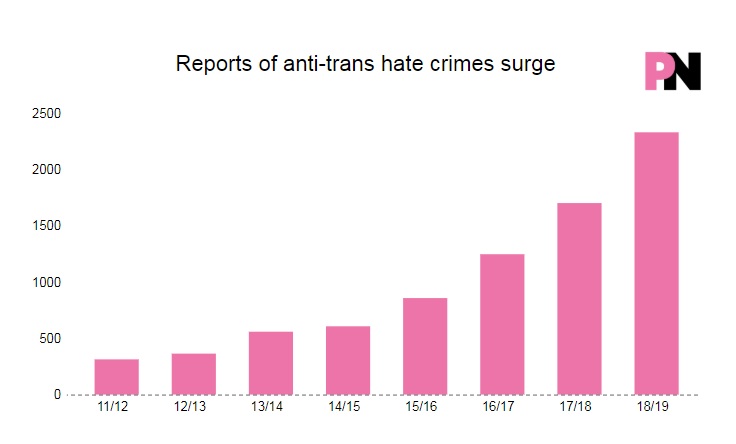An overwhelming majority of homophobic hate crimes end in convictions, but more work needs to be done with transphobic hate

Thousands of transgender people and their allies take to the streets for London’s first ever Trans+ Pride march on 14 September, 2019. (WIktor Szymanowicz/NurPhoto via Getty Images)
As England and Wales are haunted by a spree of violence against the community, an overwhelming majority of anti-LGBT+ hate crimes actually end in convictions, according to data.
The Crown Prosecution Service – the body responsible for conducting criminal prosecutions – released data today revealing that the courts are handing down tougher and more frequent convictions than ever before for homophobic crimes.
Around nine out of every 10 reported anti-gay hate crimes end in a conviction being enforced.
However, transphobic hate crimes have seen a slight drop in convictions but the CPS warn that, as so few incidents are reported, even minor changes can significantly impact data trends.
Nevertheless, around seven out of every 10 reported transphobic hate crimes end in a conviction.
Nearly 90 percent of all homophobic hate crimes end in convictions.
“Hate crimes are one of the priorities for the CPS,” Chris Long, CPS hate crime lead told PinkNews.
“It’s an offence aggravated by hate and therefore is fundamentally wrong and something we need to ensure continues to be a priority for us.”
Compared to the previous year, the conviction rate for homophobic hate crimes increased slightly from 84.9 percent in 2017-18 to 86.8 percent in 2018-19.

Overall, there has been an increase in reports of anti-LGBT hate crimes ending with convictions across the last few years. PinkNews)
Of all hate crime the CPS prosecuted, racially-motivated crimes topped the statistics. Around 9,931 racial hate crimes were charted, followed by 1,624 homophobic hate crimes.
Religious crimes stood at 605, then disability (579) and transphobia (89) offences.
However, conviction rates for transphobic crimes have decreased slightly. From 76.8 percent in 2017-18 to 74.2 percent in 2018-19.
LGBT+ people subjected to abuse ‘don’t realise’ it’s a criminal offence.
The CPS also works with anti-hate groups including Stonewall to help prosecutors better understand different types of hate crime and the impact on victims.
The CPS can, if evidence proves sufficient, ask for a sentence uplift. This is where the sentence slammed is intensified at the CPS’s request.
For homophobic hate crimes, the proportion of cases resulting in a conviction with an announced and recorded sentence uplift was 70.9 per cent in 2018-19, an increase from 64.1 per cent the previous year – an increase of 6.8 percentage points.

Shoppers carry bags across a Pride-themed, rainbow-coloured pedestrian crossing for London Pride 2019. (David Cliff/NurPhoto via Getty)
Although, for anti-trans crimes, the uplift was 48.4 per cent in 2018-19, a decrease from 58.1 percent the previous year – a decrease of 9.6 percentage points.
“What we work hard to do is build confidence in prosecuting hate crime,” explained Long. “Our conviction rates for the previous years have been relatively steady and strong in hate crime.”
If detectives find sufficient evidence that the incident was a hate crime – combing for “signs of hostility” – it is referred to the CPS. The body examines police evidence and decide if the case should be taken to criminal prosecution.
“It’s often the case that members of the community feel they are subjected to abuse, but don’t realise it may be a criminal offence,” Long said.
Transgender hate crimes have risen faster than for any other protected group.

Hate crimes against transgender people are surging, according to Home Office data
Specials measures can also be applied for vulnerable victims or witnesses, who can be hidden from view or can supply evidence via video in court cases.
The CPS work with local and national police to enhance the law enforcement understanding of how to navigate hate crime.
An understanding is crucial as, according to statistics from the Home Office, anti-LGBT hate crimes have soared.
Many members of the community feel clouded by this. This month, a gay man was spat on and verbally harassed by a couple in London in an attack that left him “traumatised” and afraid to be who he is.
He explained: “I think hate crime has gotten worse recently. I don’t feel it is being taken seriously.
“I remember 10 years ago I would go to a gay club in baggy clothes and only change when I got there. I may have to start doing that again.
“Since that [London bus] attack I deliberately put more money on my Oyster card so I can get a train instead of the bus.”

